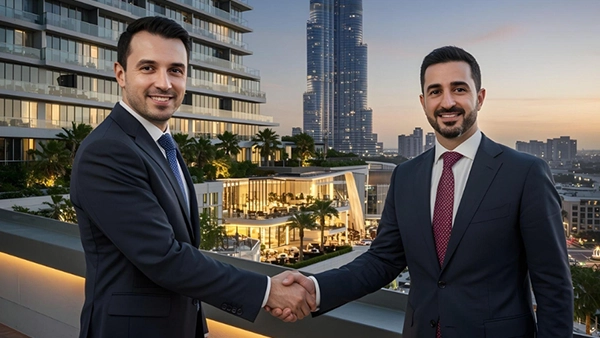How Foreign Investors Can Start Their Real Estate Journey in Dubai
Dubai has consistently remained at the center of international investor attention.
As one of the few global cities offering 100% property ownership in designated zones, no income taxes, and a transparent real estate framework, it’s no surprise that expats continue to choose the emirate to grow their wealth.
Dubai’s Investment Advantage for Expats
Dubai’s real estate market is underpinned by a strong legal infrastructure and a tax-friendly environment.
It allows foreigners to own freehold properties, provides investor residency pathways, and operates without property taxes or capital gains tax.
The emirate also offers unmatched infrastructure, safety, and a high standard of living, qualities that consistently attract expatriates from Asia, Europe, and the Americas.
With premium houses for sale in Dubai and dynamic zones like apartments in Dubai Marina, the city caters to diverse preferences and budgets.
These benefits are not limited to one category of investor.
Whether someone is a salaried professional, entrepreneur, or retiree, the system is built to accommodate and reward long-term participation.
Beginning the Investment Journey
The process starts with exploring areas open to foreign ownership, locations such as Dubai Marina, Downtown, Business Bay, and Jumeirah Village Circle.
These zones are known for their investment returns, community lifestyle, and strategic connectivity.
After choosing the right area and property type, the next step is to engage with trusted real estate brokers or directly with reputed developers.
Key legal steps include drafting and signing a Sales Purchase Agreement (SPA), placing a booking amount (typically 5–20%), and securing an official Title Deed upon transaction completion.
Payments are made securely through escrow accounts regulated by Dubai’s Real Estate Regulatory Agency (RERA).
What’s Needed to Invest in Dubai
Investing in property requires a valid passport and proof of funds.
Buyers purchasing jointly, such as spouses, siblings, or business partners, must provide legal documentation to establish the shared ownership. For couples, this means submitting a marriage certificate. In other cases, proof may include a power of attorney, business ownership documents, or other relevant legal agreements, depending on the nature of the relationship.
For those looking to link their property with a residency visa, the minimum investment starts at AED 750,000.
For long-term options like the UAE Golden Visa, property investments must meet or exceed AED 2 million.
Residency-related steps include undergoing a medical test, acquiring police clearance, and submitting the required documents for processing.
Developers often guide buyers through these formalities or partner with visa facilitation services.
Tailored Opportunities for Different Professions
The city’s real estate ecosystem is not constant for all.
Professionals across industries are finding it increasingly viable to buy property in Dubai either as an end-user or an investment.
Medical professionals working in the UAE or overseas often have stable income structures, making it easier to commit to property in high-return zones like Al Furjan or Dubai Marina.
With visa eligibility linked to real estate investment, many in the healthcare field also see this as a way to secure long-term residency for their families.
Armed forces personnel or veterans seeking post-retirement investments often look for peaceful villa communities in suburban areas like Arabian Ranches or Damac Hills.
These locations offer security, long-term appreciation, and a slower pace of life, ideal for retirement planning.
Corporate employees in finance, legal, tech, or consulting roles often gravitate toward mixed-use properties near central business zones such as Downtown or DIFC.
These properties offer lifestyle access and strong rental yields.
Entrepreneurs and small business owners, particularly those operating in free zones, prefer investing in real estate both for asset security and to gain residency.
Business owners often choose off-plan units that align with expansion plans or dual-purpose family living.
Freelancers and remote workers are using Dubai’s flexible freelance permits and visa structures to base themselves in the city.
Studio apartments in emerging zones like JVC or Arjan offer lower entry points and access to a growing rental market.
Retirees are also entering the market, drawn to the climate, healthcare, and lifestyle benefits.
The city’s retirement visa program, launched in partnership with the Department of Tourism and GDRFA, encourages older investors to settle down comfortably in self-owned homes.
No Matter the Tax Slab, Investment is Rewarding
Dubai’s property market is built to accommodate investors from all global tax brackets.
Whether an individual is based in a high-tax European country or a zero-tax jurisdiction, property income and gains in Dubai are not subject to local taxes.
This creates a unique opportunity for international investors to diversify without the tax liabilities found in other financial centers.
The combination of no income tax, full ownership rights, and stable long-term returns makes it particularly attractive for those seeking both wealth preservation and lifestyle migration.
The Role of Developers in Enabling This Journey
Developers play a pivotal role in shaping the foreign investor journey.
Reputed firms like Danube Properties have consistently delivered high-quality projects across JVC, Business Bay, and Dubai Silicon Oasis.
Their flexible payment plans, customer-centric approach, and transparent processes have helped thousands of foreign investors enter the Dubai real estate market with confidence.
By offering 1% monthly payment structures, post-handover plans, and comprehensive post-sale support, Danube and similar developers reduce the barriers to entry and ensure smoother transactions, especially for first-time overseas buyers.
As Dubai continues to expand its horizons and welcome foreign capital, the real estate market remains one of the most rewarding avenues for expatriates looking to build tangible, secure assets in the Middle East.

